They might not be raindrops on roses or whiskers on kittens, but that doesn’t mean that we love them any less. Welcome back to My Favorite Things, the weekly column where we grab someone in speculative circles to gab about the greatest in geek. This week, we sit down with Sandra Kasturi, whose short story, “The Beautiful Gears of Dying,” recently won the Sunburst Award.
What does Sandra love when she’s not running a publishing house and writing award-winning stories? Spoiler alert: fairy tales translated to poetry, a Grand Master of science fiction that we lost too soon, adorable trolls, comfort reads, a movie so bad it’s good, and a galaxy far, far away. Intrigued? Read on to learn more!
You know, whenever you say you write poetry, everyone has to struggle to keep from rolling their eyes. I’m sure you’ve seen it. Hell, I write poetry and I’ve rolled my eyes when I hear people talk about poetry. I mean, rolled them internally because I try not to be an asshole. But who knows? I have no poker face, so maybe there are lots of angry poets out there? The thing is — so many poets are pretentious wanks or are tiresome in myriad other ways. (If I hear one more person talking about their “craft,” I will not be responsible for my actions.) So I’m always thrilled when I find poetry (or poets) I actually like.
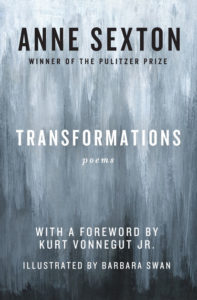 Back in university, during the Cretaceous, I took a creative writing course with poet Susan Glickman. One of the greatest things she ever did for me was to turn me on to Anne Sexton’s poetry. I had gotten very tired of hearing how my own work was like Sylvia Plath’s (I’d never read Plath), so to hear that I was writing in the same vein as someone else was terribly exciting. The book Susan recommended to me was Anne Sexton’s Transformations, a collection of poetry inspired by fairy tales. There really couldn’t have been anything that seemed more especially written for me (except maybe the stories of Angela Carter), that’s how much it resonated. Plus there was a Kurt Vonnegut introduction. (Vonnegut, for goodness sake!)
Back in university, during the Cretaceous, I took a creative writing course with poet Susan Glickman. One of the greatest things she ever did for me was to turn me on to Anne Sexton’s poetry. I had gotten very tired of hearing how my own work was like Sylvia Plath’s (I’d never read Plath), so to hear that I was writing in the same vein as someone else was terribly exciting. The book Susan recommended to me was Anne Sexton’s Transformations, a collection of poetry inspired by fairy tales. There really couldn’t have been anything that seemed more especially written for me (except maybe the stories of Angela Carter), that’s how much it resonated. Plus there was a Kurt Vonnegut introduction. (Vonnegut, for goodness sake!)
Sexton took our familiar fairy tales from Grimm and Perrault and turned them on their heads. She gave each of her poems a real bite, and often a sly wink. No one uses language quite like she does:
Hurry, Godfather death,
Mister tyranny,
each message you give
has a dance to it,
a fish twitch,
a little crotch dance.
—from Anne Sexton’s “Godfather Death”
There a few poets out there who made me . . . reframe, I guess, what I thought poetry could be, and Sexton is one of them. When a friend gave me a first edition of Transformations, I was literally speechless with gratitude. That book remains one of my most treasured possessions.
So if you hate poetry, read Anne Sexton’s book — I think you’ll be surprised, delighted and disturbed.
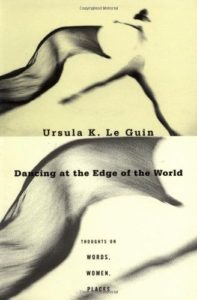 I get so tired of hearing what a great female writer Ursula K. Le Guin was. She wasn’t a great female writer. She was a great writer. She wrote in many genres and was brilliant in all of them. From science fiction (her Hainish novels, especially The Left Hand of Darkness), fantasy (the Earthsea books), poetry, short fiction, and more. If you want criticism and critical thinking, you can’t go wrong with Le Guin’s essay “Close Encounters, Star Wars, and the Tertium Quid” which you can find in her collection, Dancing at the Edge of the World. It’s a thoughtful exploration on what a “real” science fiction film is or should be.
I get so tired of hearing what a great female writer Ursula K. Le Guin was. She wasn’t a great female writer. She was a great writer. She wrote in many genres and was brilliant in all of them. From science fiction (her Hainish novels, especially The Left Hand of Darkness), fantasy (the Earthsea books), poetry, short fiction, and more. If you want criticism and critical thinking, you can’t go wrong with Le Guin’s essay “Close Encounters, Star Wars, and the Tertium Quid” which you can find in her collection, Dancing at the Edge of the World. It’s a thoughtful exploration on what a “real” science fiction film is or should be.
Le Guin was a seminal voice in genre fiction. At a time when the genre was dominated almost entirely by white men, she made herself heard. Not only that — she had people of color in her books. Not just as best friends or fonts of wisdom for the white protagonist to play off of, but as main characters. Real people. And her female characters weren’t just there to look pretty and root the men on. Le Guin was doing this in the 1960s — which, given the times, is pretty amazing. It’s like she looked at the speculative landscape, found it both appalling and absurd, and just created her own. You would think that after nearly sixty years, things would have radically improved (isn’t science fiction the ultimate genre of hope?), but, well . . . you don’t need me to tell you to watch the (fake or otherwise) news. Things are better in some ways, but in others, they haven’t changed that much.
One of my greatest regrets is that I never met Ursula Le Guin in person. One of my greatest joys is that we had occasional email discussions. I sent her my poetry book, The Animal Bridegroom, and she actually read it! And she wrote to me, “I hope you don’t mind me saying this . . .” — and I thought, Oh, no! — “but I’ve been reading your poetry book in the bathroom.” Which made me laugh so much! I told her, no I didn’t mind, and in fact, my poetry had often been read in the bathroom. Then she told me she liked my work, and my whole year was made.

Photo by Benjamin Reed
When Le Guin turned eighty, Karen Joy Fowler and Debbie Notkin put together a “festschrift” of works celebrating her life — 80! Memories & Reflections on Ursula K. Le Guin. It was one of the greatest honors of my life to have a poem included in that collection.
Rereading Le Guin, and other writers like her, reminds me to keep working for change, even if it’s only in a small way. Keep listening. Keep hoping. No, maybe not hoping. Believing there will be a future. And a better one at that.
People who grew up in Europe, or who had parents from Finland or the Baltic countries are probably more familiar with Tove Jansson’s Moomins than North Americans, but those of us on this side of the pond who love them, love them unreservedly. Jansson’s first book Finn Family Moomintroll is so charming and funny, and kind of deeply weird, that it becomes this favorite giddy aunt of a book, which you trot out on holidays and special occasions, throw yourself into its arms, and enjoy its company once more.
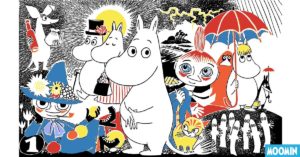
If you don’t know them, Moomintrolls are, well, trolls. But they’re adorable trolls. They’re round-bellied and have tails and they hibernate in winter after “eating properly pine needles” as Moominmamma says in her handwritten letter at the start of the English edition. Moominpappa has a top hat and Moominmamma has a capacious handbag. The Moomin children and other small creatures like Snufkin have adventures and make teeth out of orange peels and swing from the chandeliers. It’s so fun. And the Muskrat! His whiskery little face! He is always busy hating things and lying in his hammock, rereading The Uselessness of Everything. Until the Hobgoblin comes and magics it into The Usefulness of Everything, which makes the Muskrat so cross. Also: The Hattifatteners! The Hemulen! Thingumy and Bob! Oh, I could go on.
Jansson’s original illustrations are charming and perfect. I of course have lots of Moomin paraphernalia and am insanely jealous of Michael Thomas Ford’s Moomin mug collection.
Whenever I feel sad, I revisit the Moomins — especially when it’s snowy and cold and feels like Narnia under the White Witch (always winter and never Christmas). The Moomins in summertime Moominvalley always cheer me up.
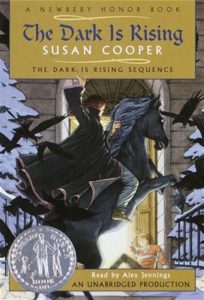 Speaking of the comfort of Moomins, there are others I also think of as “comfort books” for regular rereading and wallowing. Sometimes they are seasonal, like Agatha Christie’s The Adventure of the Christmas Pudding; sometimes they are just worlds I revisit annually (like Narnia or Middle-Earth or Charlaine Harris’s Bon Temps). Reading beloved works is like coming home and easing into your favorite pajamas with a sigh of relief. Susan Cooper’s Dark Is Rising series is like that for me. I read the five books originally as a child, and have continued to re-love them every couple of years. Here’s how nutty I get about this. Book one, Over Sea, Under Stone, takes place during the summer, so that’s when I like to read it. Book two, The Dark Is Rising, takes place around Christmas, so that’s when I read that one. And so on and so on for the rest, in full OCD fashion. The books are set mainly in England in the 1960s, with a side trip or two to Wales. (Clearly the next step is to read them on site in Blighty.)
Speaking of the comfort of Moomins, there are others I also think of as “comfort books” for regular rereading and wallowing. Sometimes they are seasonal, like Agatha Christie’s The Adventure of the Christmas Pudding; sometimes they are just worlds I revisit annually (like Narnia or Middle-Earth or Charlaine Harris’s Bon Temps). Reading beloved works is like coming home and easing into your favorite pajamas with a sigh of relief. Susan Cooper’s Dark Is Rising series is like that for me. I read the five books originally as a child, and have continued to re-love them every couple of years. Here’s how nutty I get about this. Book one, Over Sea, Under Stone, takes place during the summer, so that’s when I like to read it. Book two, The Dark Is Rising, takes place around Christmas, so that’s when I read that one. And so on and so on for the rest, in full OCD fashion. The books are set mainly in England in the 1960s, with a side trip or two to Wales. (Clearly the next step is to read them on site in Blighty.)
The stories center mainly on young Will Stanton — the last of the “Old Ones” to be born — guardians on the side of the Light, who of course fight the ever-encroaching forces of the Dark. Classic stuff. Throw in some Arthurian mythology, treasure hunting for powerful objects like swords and grails, and regular human kids Simon, Jane and Barney Drew, and you have every kid’s wish fulfillment fantasy of finding out you’re special and can be part of powerful forces fighting on the side of Good. Also, I have such an obsession with reading about British children doing Very British Things. Probably why I swooned over Harry Potter too. I’m fairly certain all of rural England is full of wizards and descendants of Arthur or even just people saying “that’s simply wizard.” Please don’t disillusion me.
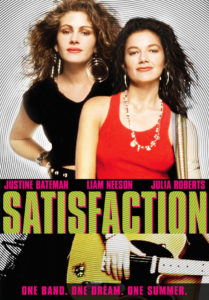 Before I get to my final favorite thing, I’m going to take a weird little segue into a non-spec favorite thing, and one of those shameful secrets we all have about stuff we adore yet we know are terrible. Like a shitty boyfriend we can’t manage to dump, but who has some kind of weird emotional hold on us. You know? Here goes: It’s Justine Bateman’s movie Satisfaction (also called Girls of Summer when released on TV) from 1988. Don’t judge me. No, wait — you should totally judge me! It’s terrible.
Before I get to my final favorite thing, I’m going to take a weird little segue into a non-spec favorite thing, and one of those shameful secrets we all have about stuff we adore yet we know are terrible. Like a shitty boyfriend we can’t manage to dump, but who has some kind of weird emotional hold on us. You know? Here goes: It’s Justine Bateman’s movie Satisfaction (also called Girls of Summer when released on TV) from 1988. Don’t judge me. No, wait — you should totally judge me! It’s terrible.
The tag line is “One band. One dream. One summer.” Oh, yes. It’s a girl band summer movie. And it’s got some b-list actress called Julia Roberts receiving third or fourth billing. ’Cause Justine Bateman is the star. She does all her own singing too!
Umm . . . I also have the soundtrack album, god help me. And whenever it’s on TV, I watch it again. I can not look away. Satisfaction is basically about a girl band that gets a gig playing in a bar all summer. Justine Bateman has a fling with the bar owner . . . Liam Neeson! (Oh wait—he was in Phantom Menace, so there is a spec link! See what I did there?) Of course, Justine Bateman gets offered a solo gig, but she has to ditch her band. Oh, the moral quandaries! Bateman isn’t a great singer, but that’s really her, and it’s her real band, The Mystery, on the soundtrack. Britta Phillips, as one of her bandmates actually has a cool raspy voice, and there’s a scene where she sings “Mr. Big Stuff” which is pretty good. They also cover “Iko Iko” which is one of my favorite songs of all time. Is that why I love it so much? I don’t know. It’s really not very good. But Debbie Harry shows up at one point . . .? Seriously, what’s wrong with me? I can’t stop watching it.
Okay . . . shaking off the mesmeric qualities of Satisfaction and moving on!
My final favorite thing. It feels like such a nerd cliché that I was actually hesitant to write about this, but . . . I can’t help it. One of my favorite things to date remains Star Wars. And, in true nerd fashion, yes, yes, I do love the first two films best. And I pretend that the prequels never happened. But, you know what? I dug Episodes 7 and 8. I really did. And I loved Rogue One. And I even liked Solo.
I think a big part of it goes back to the sheer unabashed sense of wonder I experienced when first seeing Star Wars. It was a year after the film had been out. My mother took me to see it in the theater, because she had heard that kids loved it. I think I was twelve. The movie blew my mind. Blew. My. Mind. I already read and loved genre fiction. I had devoured mythology and fairy tales and Tolkien and C.S. Lewis (and not just his Narnia books). I’d read Bradbury, Asimov, Clarke and my beloved Ursula Le Guin. But nothing cemented my love for genre film and fiction more than Star Wars did that day. I probably watched the whole movie with my mouth open in sheer astonishment and joy.
Here’s the thing. When I got back home, the first thing I did was shut myself in my bedroom, throw myself on the bed, and sob uncontrollably. Because I knew I would never get off this planet. I suppose I could have tried to get onto an astronaut career path, but that wouldn’t have given me access to a galaxy teeming with sentient life, to swashbuckling adventure, to lightsabers! Also, I’m no good with heights. But that joyfulness stayed with me, and maybe my entire life has been spent, to some degree, in pursuit of that blissful suckerpunch to the soul.

I did experience it again nearly forty years later. My husband Brett told me to keep this one night in December free for a special surprise outing. I said, “Is this something where we’ll be standing? Sitting? Do I need to dress up?” No. Sitting down. Casual. I thought, Okay. Maybe it’s a show? Oh my god . . . what if it’s The Force Awakens? Nah, it’s sold out everywhere.
The night in question arrived. Brett said, “Any guesses on where we’re going?”
And I said, “Not really.” We got in the car and headed downtown. So . . . could be a show? A band? I couldn’t remember what plays or musicals were on in the big theaters. Was Matt Dusk in town? I could listen to him all day. Then we headed west. Not the downtown theaters then, so probably not a show. We drove farther and farther west. Only thing out here would be movie theaters or maybe a bar with an obscure band? Probably not a band. Movie then. Oh my god, could it be the new Star Wars? No way.
Brett said again, “Any idea yet?”
I said (sounding very high-pitched): “Is it The Force Awakens?”
And he said, “No, sorry, Monkey. It was sold out.”
I tried not to sound too disappointed. “Is it a movie, though?”
“Yeah,” said Brett. “I just thought it would be nice to have a night out with Monkey.”
“Oh Monkey!”
We arrived at the theater. There were about twelve movies playing, but I had to pee so badly, I barely noticed what most of them were. The Force Awakens was one, but I knew that was off the table.
Is there a Marvel movie out? I wondered while in the bathroom. No, those were usually in the spring. Was there a new Blumhouse horror movie? I couldn’t remember.
Brett had told me what theater to meet him in and I rushed there — nothing I hate more than getting in late and missing the previews. Unless it’s people who talk through the previews. (They should be silenced at once. Maybe with duct tape or a bat.)
People were standing in front of the movie poster outside the entrance to Theater No. 7, so I couldn’t even see the poster. Annoying! But I could hear the usual PSA starting: “Don’t talk during the movie, assholes.” (Well, it’s Canada, so, really, “Don’t talk during the movie, assholes, please.”) I ran into the theater, found Brett, and flung myself into the seat next to him. He handed me my bag of Twizzlers red licorice Nibs.
“You know what the movie is now, obviously!” said Brett.
“I don’t! I couldn’t see the poster!”
“You really don’t?”
“I really don’t!”
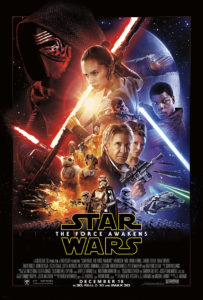 The previews started. They were all for genre movies. So, obviously, we were about to see something SF/F/H. Wait . . . Was Brett messing with me? Naaah.
The previews started. They were all for genre movies. So, obviously, we were about to see something SF/F/H. Wait . . . Was Brett messing with me? Naaah.
The previews ended.
The real movie was about to start.
The logo came up.
It was Lucasfilm.
I think I audibly gasped, and I grabbed Brett’s hand and squeezed it so hard I crushed his fingers.
The familiar John Williams music started with the infamous opening exposition crawl. I squeezed Brett’s hand even harder.
We looked at each other. I think I was smiling harder than I had in years and he was laughing at my crazed glee.
And you know? I was really thrilled with The Force Awakens. And yeah, yeah, I know — it’s basically the plot of A New Hope. So what? It was still outrageously good fun. Really, it was very clever of J.J. Abrams. After the debacle of the prequels, he needed to make us feel secure, remind us of what we loved and get us back on board. So he gave us what was familiar. Brought back Han and Leia, and even Luke (Luuuuuke!) at the end. He gave us new characters to love and cheer for. And despise. He gave us comedy and tragedy (oh Han!). He gave us breathtaking chases and cool locations and a big old space opera romp. He gave us joy. And no talk of trade routes and blockades and taxation and weird (so so weird) romantic attachments between small children and older princesses.
I grinned like a maniac through that whole movie. I ate the entire bag of Nibs. I went home with joy in my heart and a stomach ache. So it kind of was like I’d gotten my childhood back.
I’d found a way into my sense of wonder again — through Star Wars. Again. Thanks to my husband. And J.J. Abrams. And George Lucas. (Whom I am grudgingly grateful to. Still cross about Episodes I-III.)
And that is why Star Wars remains one of my favorite things — and that moment from my childhood, and its mirror so many years later as an adult, remain touchstones on this long-seeming journey on our little blue-green spaceship hurtling round the same star, still dreaming of what might be.
 Sandra Kasturi is the publisher of ChiZine Publications, winner of the World Fantasy, British Fantasy, and HWA Specialty Press Awards. She is the co-founder of the Toronto SpecFic Colloquium and the Executive Director of the Chiaroscuro Reading Series, and a frequent guest speaker, workshop leader, and panelist at genre conventions. Sandra is also an award-winning poet and writer, with work appearing in various venues, including Amazing Stories, Black Feathers: Dark Avian Tales, Prairie Fire, several Tesseracts anthologies, Evolve, Chilling Tales, ARC Magazine, Taddle Creek, Abyss & Apex, Stamps, Vamps & Tramps, and 80! Memories & Reflections on Ursula K. Le Guin. She recently won the Sunburst Award for her short story, “The Beautiful Gears of Dying,” in the anthology The Sum of Us. Her two poetry collections are: The Animal Bridegroom (with an introduction by Neil Gaiman) and Come Late to the Love of Birds. Sandra is currently working on another poetry collection, Snake Handling for Beginners, a story collection, Mrs. Kong & Other Monsters, and a novel, Wrongness: A False Memoir. She is fond of red lipstick, gin & tonics, and Idris Elba.
Sandra Kasturi is the publisher of ChiZine Publications, winner of the World Fantasy, British Fantasy, and HWA Specialty Press Awards. She is the co-founder of the Toronto SpecFic Colloquium and the Executive Director of the Chiaroscuro Reading Series, and a frequent guest speaker, workshop leader, and panelist at genre conventions. Sandra is also an award-winning poet and writer, with work appearing in various venues, including Amazing Stories, Black Feathers: Dark Avian Tales, Prairie Fire, several Tesseracts anthologies, Evolve, Chilling Tales, ARC Magazine, Taddle Creek, Abyss & Apex, Stamps, Vamps & Tramps, and 80! Memories & Reflections on Ursula K. Le Guin. She recently won the Sunburst Award for her short story, “The Beautiful Gears of Dying,” in the anthology The Sum of Us. Her two poetry collections are: The Animal Bridegroom (with an introduction by Neil Gaiman) and Come Late to the Love of Birds. Sandra is currently working on another poetry collection, Snake Handling for Beginners, a story collection, Mrs. Kong & Other Monsters, and a novel, Wrongness: A False Memoir. She is fond of red lipstick, gin & tonics, and Idris Elba.
Would you like to write about YOUR favorite things for Speculative Chic? Check out our guidelines and fill out the form here.

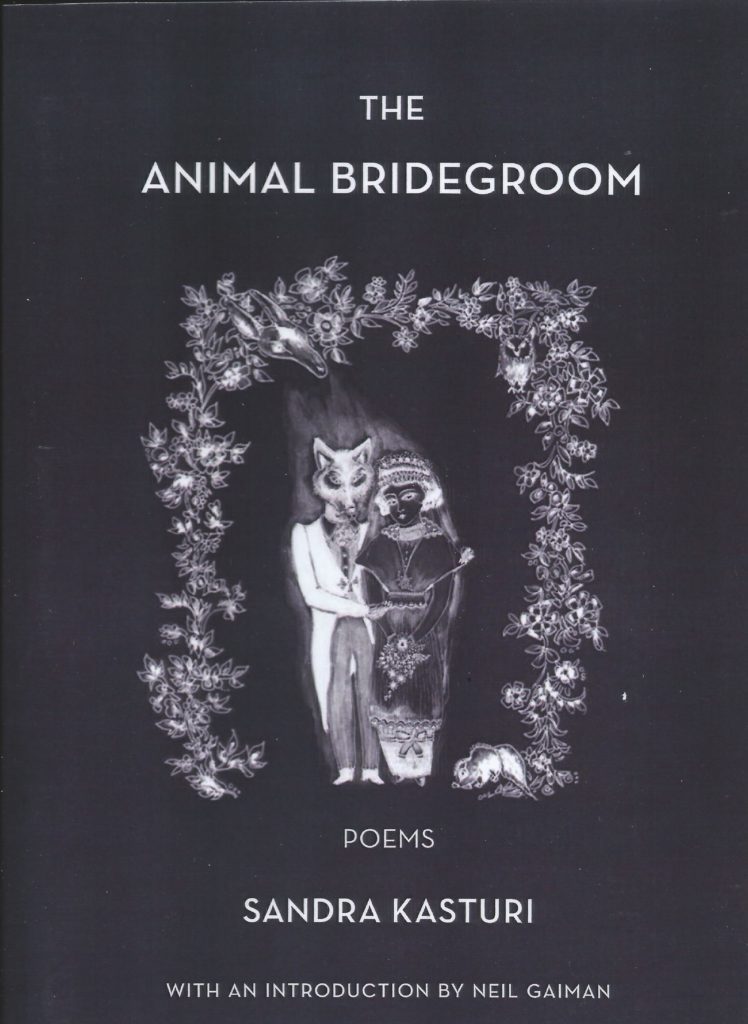
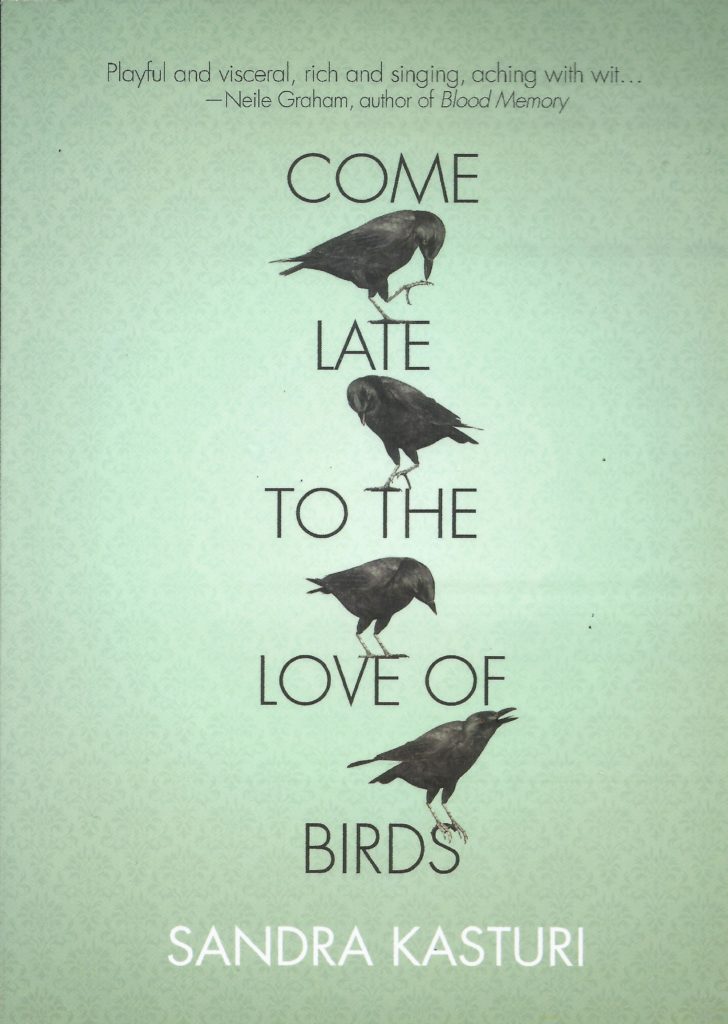
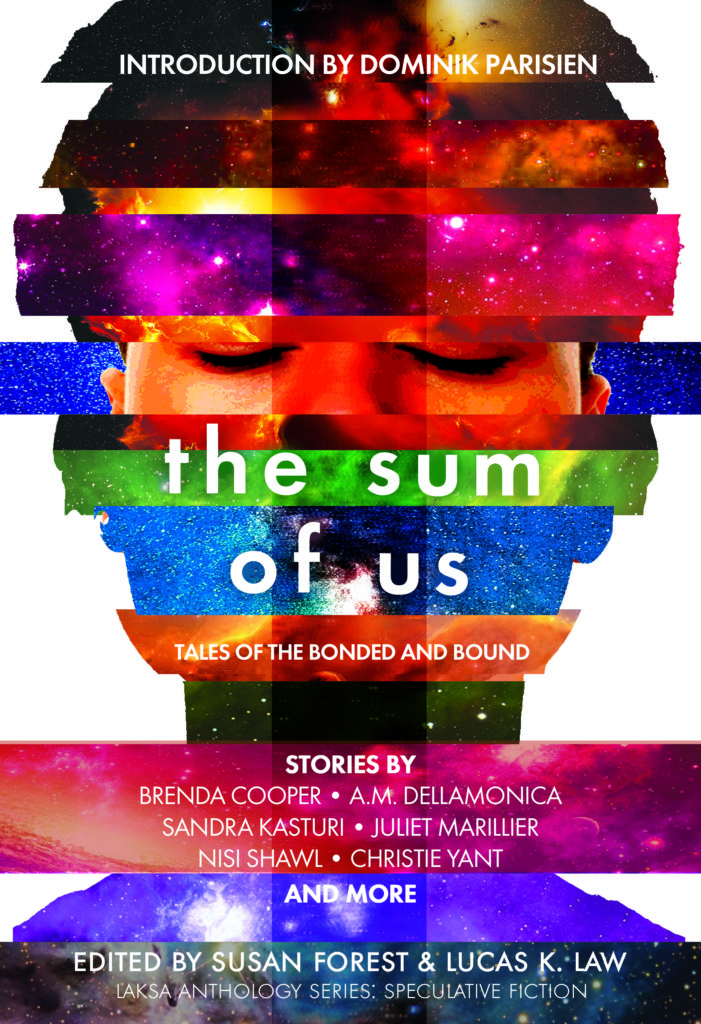
Sandra, thank you so much for joining us!